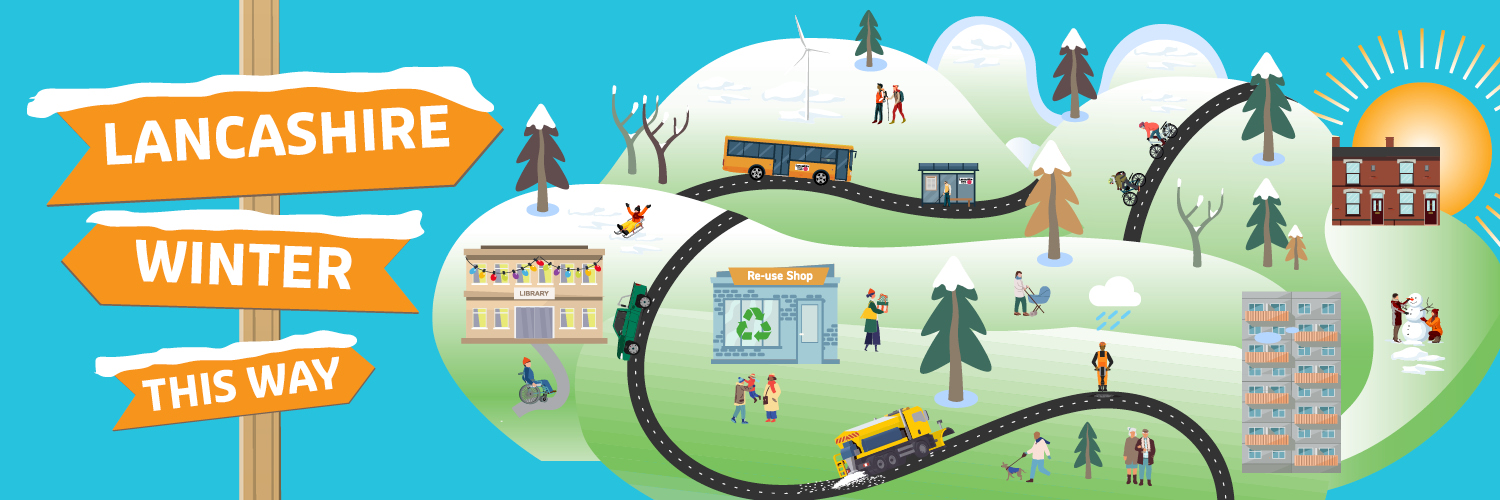We're prepared, are you?
We do everything we can to keep traffic moving on priority roads and we are open about the fact we cannot grit every road in Lancashire. Even if we had the resources needed we couldn't grit them quickly enough to make a real difference.
No council does this. It is important people understand there are limitations to the service we can provide.
That is why we ask residents to take steps to make sure that when severe winter weather strikes they are prepared and able to manage.
No council does this. It is important people understand there are limitations to the service we can provide.
That is why we ask residents to take steps to make sure that when severe winter weather strikes they are prepared and able to manage.
- Find out if you are on a gritting route - view our gritting map of primary and secondary routes around the county. If you are not on a gritting route, prepare ahead of winter.
- Stock up on salt/grit - stock up on salt/grit for your personal use from a range of DIY stores. It's also useful to have a snow shovel, a torch, batteries and a first aid kit handy.
- Schools - schools are classed as private grounds and gritting them is not a county council function. We do however give schools in Lancashire the opportunity to buy grit from us at the start of the winter. See our school closures page for the latest unavoidable closures during winter.
- Take extra care - during freezing conditions do not assume a road has been treated and drive with caution, ice could have formed despite our efforts.
- Support for businesses - we give permission for some businesses to use, at their own expense, an approved contractor to clear snow from roads that are not on the county council's priority or secondary networks.
- Travelling safely during the winter - check the weather forecast before you set off and leave extra time for your journey during winter. Despite our best efforts, winter weather can still make roads treacherous and there is no guarantee that roads will always be completely free of ice and snow. See our travelling safely page for further tips and advice.
- Don’t block the road for the gritter - if you park your car on a main road or gritting route during winter, please make sure it's not causing an obstruction as blocked roads could mean we are unable to grit that road.
- Looking after older and vulnerable people - look after yourself and keep an eye on friends, relatives and older neighbours who may be more vulnerable to the cold weather, especially if they suffer from any ongoing medical conditions.
- Grit bins - how often we re-fill grit bins depends on a number of factors including weather, the number of grit bins needing to be filled and the availability of material. Help everyone by not using the grit for purposes other than for gritting the roads and pavements in the vicinity of the bin. They are placed in strategic locations to help deal with specific hazards and using the grit for other purposes could lead to unnecessary risks to other people if the grit runs out.
Tips for clearing snow and ice
Clearing snow and ice from the pavement outside your home or public spaces can help prevent slips and falls. Here's some advice from the snow code.
Prepare your business
Advice on gritting and winter maintenance to help you stay operational during winter.
A day in the life of a gritter driver
Alan Croasdale, Highways Technician talks us through a typical day as a gritter driver.
Let us know
Keep up-to-date
- Latest gritting updates
- Follow #LancsWinter on X *
- Highways updates *
- Met Office forecast *
- Met Office Weather Ready campaign *
* External links
